2ND LEAD (Adds full text of the appeals) Jaffna students demand US and UN agenda-setters to declare PTA detainees as political prisoners[TamilNet, Tuesday, 14 November 2017, 23:44 GMT]More than 1,000 Tamil students from across the faculties of Jaffna University as well as the students from the College of Education, Jaffna Technical College and High Tech institute took to the streets in Jaffna on Tuesday demanding the main intervening actors of the International Establishment to recognise the Tamil prisoners detained under the so-called Prevention of Terrorism Act as Political Prisoners. They handed over open and urgent appeals addressed to UN High Commissioner for Human Rights, the President of UNHRC and to the US Permanent Mission for UN in Geneva, which has been behind the drafting of the ‘consensus’ resolution with the SL State in Geneva Human Rights Council in 2015 and with postponing a final evaluation by two more years in 2017. The student leaders handed over the appeals through the UN Residential Office in Jaffna and the American Corner in the city. The American Corner was initially reluctant to receive the appeal, but later received the document, the student leaders said. Arguing that the self-determination conflict and the war between the LTTE and the GoSL in the island were of international character according to Geneva Conventions’ Additional Protocol I, the student leaders argued that all Tamil Prisoners of War should not be dealt with criminal procedures by the SL State. However, the SL State which violates Tamils self-determination through 6th Amendment and which has not ratified the Additional Protocol I of the Geneva Convention, doesn’t even recognise the Tamil detainees and convicted prisoners as political prisoners. The student leaders pointed out the culpability and the responsibility on the part of the UN mechanism in Geneva and the US Establishment for the turn of affairs in the island that have deprived Tamils of their rights and freedoms. The UN failed on its Right to Protect (R2P) obligations in 2009 and the US Establishment, which intervened during the times of war, peace and post-war with its strategic interest in mind, has behaved with lopsided morality towards Eezham Tamils, the appeal implies. The US Establishment is committing the same ‘mistake’ as it did in 2005 immediately after the GoSL and LTTE signed the agreement on Post-Tsunami Operational Management Structure (P-TOMS), the appeal of Jaffna University Student Union argues. The US position in 2005 caused the P-TOMS to be eventually scuttled by the SL Supreme Court. Similarly, the US role in post-2009 scenario is seeking to impose a victor's peace in the island rather than a negotiated peace for Tamils, the appeal said demanding the US Human Rights mission in Geneva in particular to recognise PTA detainees as political prisoners. The appeal also condemned the use of the term ‘security detainees’ by UN Human Rights High Commissioner Prince Zeid bin Ra'ad towards Tamil political prisoners. Full text of the appeal document follows: Open appeal to UN Human Rights High Commissioner, the UN Human Rights Council and to the USA, the lead sponsor of consensus resolution on Sri Lanka We, the student community of Jaffna University, are writing this urgent appeal on behalf of the Tamil political prisoners and their families. This open appeal is addressed to UN High Commissioner for Human Rights Zeid Ra’ad Al Hussein, President of the UN Human Rights Council (11th Cycle) Joaquín Alexander Maza Martelli and to the US Mission Chargé d’Affaires in Geneva Theodore Allegra. Copies of this appeal are being forwarded to Sri Lankan President Maithiriapala Sirisena, Prime Minister Ranil Wickramasinghe, Chairperson of the Office for National Unity and Reconciliation (ONUR) Chandrika Bandaranaike Kumaratunge, Opposition Leader R. Sampanthan and Northern Provincial Council Chief Minister C.V. Wigneswaran. 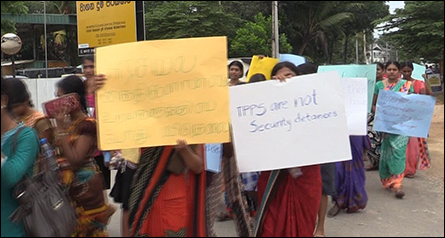 Dear Sir/Madam, At least 132 Tamil political prisoners are languishing in the prisons of Sri Lankan State across the island. Many of them have been detained for years without trial. A fast-unto-death campaign waged by three Tamil political prisoners at Anuradhapura prison was called off after the student community of Jaffna University intervened and took the responsibility of addressing their struggle to the relevant international and domestic actors. We urge the UN Human Rights mechanism in Geneva and the United States of America (USA), the main co-sponsor of Sri Lanka Resolution in the UN Human Rights Council, to recognise the Tamil detainees imprisoned under the Prevention of Terrorism Act (PTA) in Sri Lanka as political prisoners and to impress upon the Sri Lankan State to release the political prisoners through a principled political decision. The raisons d'êtres for directing our appeal to you are based on the following four categories of arguments: 1. Tamil political prisoners should be a matter of international legal concern Since 1972, the Sri Lankan State-building in the island has been a discourse dominated by the Sinhala ethnocracy. The state-formation in the island lacked a democratic Tamil mandate. It was largely a unilateral process promulgated amidst Tamil boycott in the North-East. All those who opposed the ethnocratic State-formation by peaceful means as well as by other means came to be regarded as the enemies of the State and subjected to persecution and prosecution by the Sri Lankan judiciary. The Welikade prison massacre that took place during the 1983 Black July anti-Tamil pogrom was such an act of persecution. The underlying cause behind the Tamil struggle has always been based upon Tamils' articulation of their right to self-determination. The late leader of Tamils S.J.V Chelvanayakam had consistently articulated Tamils’ right to self-determination in the parliaments of Ceylon and Sri Lanka until his demise in 1977. However, since August 1983, this right has been constitutionally denied to Tamils by through the 6th Amendment to the Sri Lankan constitution. This is a violation of the UN Charter and fundamental human rights. An armed conflict arose as the last resort means of advancing the right to self-determination struggle against a State that imposed upon them a colonial domination and deployed an ethnic military. The war that followed should therefore be considered an international conflict according to the Additional Protocol I of Geneva Conventions (GC). The Amnesty International and a range of other human rights watchdogs have referred to Liberation Tigers of Tamil Eelam (LTTE) as a party having accepted in writing its commitment to the GC together with its Additional Protocols I and II in February 1988. As a party to a self-determination conflict, confronting colonial conditions and facing a racial war, the Eelam War, as it came to be called by the Colombo press was an international conflict. And, by having accepted the GC and its Additional Protocols, the Tamil side has fulfilled its basic obligations to assert the international legal framework giving Prisoners of War (POW) status in an armed conflict. Both the parties have also exchanged POWs during the war through the facilitation of the ICRC. It is obvious that the Sri Lankan State has been refusing to recognise the status of POWs or political prisoners to Tamil detainees held under the so-called Prevention of Terrorism Act (PTA). Obviously, the Sri Lankan State, which has not ratified the Additional Protocol I and II, would not accord POW status to former LTTE members or those who are alleged of LTTE affiliation. Since the LTTE has been decimated in the war and doesn't seem to exist anymore as a de-facto entity, its POWs have been left orphaned. The only ones representing the PTA detainees at the moment are their families and relatives and the larger community of Tamils. Since the Tamil political representatives have failed to represent their case at the international fora, the student community at Jaffna University has come forward to take up the matter, especially after witnessing the outcry of the Tamil prisoners and their families. Even though the international community has failed to accord proper status to PTA-detainees as POWs under the international legal framework, the international community has a moral-bound duty to demand the Sri Lankan State to recognise them at least as political prisoners. 2. UN Responsibility The United Nations pulled out of Vanni mainland when its presence was much needed during the height of the war in September 2008. After the genocidal end of the war, Tamils have been seeking international investigations. Such an investigation has not materialised so far due to the conduct of the United Nations under its previous General Secretary Ban Ki-moon. However, the UN mechanism has admitted its failure in responding to the war in 2009. This is an admittance of the failure of applying the Right to Protect (R2P) doctrine. The “Human Rights up Front” (HrUF) launched in December 2013 initiative was based on the lessons learnt from the UN failure in addressing the humanitarian tragedy in the island of Sri Lanka. In February 2015, democratically elected Northern Provincial Council passed a resolution seeking international investigation on the allegation of genocide. The call was also citing the findings of an independent international opinion tribunal known as the People’s Tribunal on Sri Lanka (December 2013). The UN Human Rights Council only managed to carry out a scope-limited ‘OHCHR Investigations on Sri Lanka’ (OISL), which was not an independent criminal tribunal as demanded by Tamils. However, the OISL findings were also of a serious nature. The findings of the OISL report were soon overshadowed with a so-called consensus resolution for transitional justice in October 2015. Two years have elapsed; still all the human rights watchdogs are complaining that the Sri Lankan State has largely failed to implement the consensus UN resolution. But, the OHCHR and the UNHCR seem to be preoccupied with reforming the Sri Lankan State with little effect on the ground. As far as Tamils are concerned, there is a clear UN responsibility on the part of the UN to deliver its responsibility. Tamils are also worried that the ineffectiveness and failures of the UN Human Rights Council could mean denial of international justice. It is at this juncture, we the students write to you urging immediate attention on the burning issue of the Tamil political prisoners. We are also saddened to note that the High Commissioner of Human Rights referring to Tamil political prisoners as ‘security detainees’. We urge the UN mechanism to recognise PTA detainees as political prisoners and demand a written answer from the OHCHR on this issue. 3. US Responsibility The USA was one of the key Co-chair actors along with the EU, Norway and Japan in the peace process between the LTTE and the GoSL. The failure of the internationally brokered peace process, involving both the parties and the international actors, culminated into a genocidal war claiming thousands of lives in the island. During the peace process, there was a crucial humanitarian mediation process following the Tsunami catastrophe between the LTTE and the GoSL in 2005. The mediation resulted in the Post Tsunami Operational Management Structure (P-TOMS). However, the USA, which promoted the process, all of a sudden issued a controversial statement citing its FTA-related legal limitations to financially support the P-TOMS mechanism to which the World Bank was to be the international custodian. Within a few weeks Sinhala extremist sections approached the Sri Lankan Supreme Court and scuttled the P-TOMS agreement. As in the case of the P-TOMS process, the post-2009 role of the USA, with successive resolutions in Geneva, have caused serious concerns to the Tamil people as limiting the delivery of international justice. We are sad to note that the US role in Geneva has contributed primarily to stabilise a victor's peace in the island. USA co-sponsored a resolution with Sri Lanka in October 2015 placing almost the entire responsibility at the hands of the Sri Lankan State. Again, in March 2017, the USA was the lead sponsor of a resolution to extend for two years a UN role in monitoring and reporting on Sri Lanka’s implementation of commitments to promote justice and reconciliation. Serious questions are being raised to the effect that the USA has been doing ‘strategic business’ on the blood spilt and the sacrifices made by Tamils in the island. Without going into such allegations, the student community at Jaffna University wants to point out that there is a clear moral responsibility on the part of the USA in not repeating the same mistake as in the case of the P-TOMS. We urge the US Mission in Geneva to recognise the PTA detainees in the island as Political Prisoners and impress upon the Sri Lankan government to release them all through a principled political decision. 4. PTA-detainees deprived of legal liberty are political prisoners Apart from the legal and moral responsibilities of the UN and US human rights actors mentioned above, PTA detainees are political prisoners by any common standards of rationality as they meet at least one of the following criteria:
We are looking forward to your response in recognising PTA detainees as political prisoners and impress upon the Sri Lankan leaders to release the Tamil political prisoners in a dignified manner. [signed] K. Krishnameenan President Student Union University of Jaffna [signed] V. Anuraj President Arts Students’ Union University of Jaffna Chronology: |
வியாழன், 16 நவம்பர், 2017
Jaffna students demand US and UN agenda-setters to declare PTA detainees as political prisoners
இதற்கு குழுசேர்:
கருத்துரைகளை இடு (Atom)
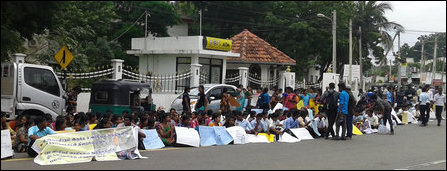

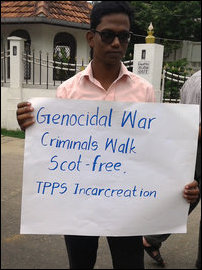
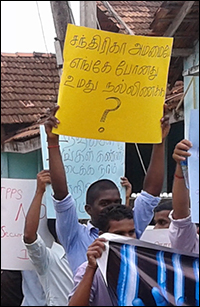
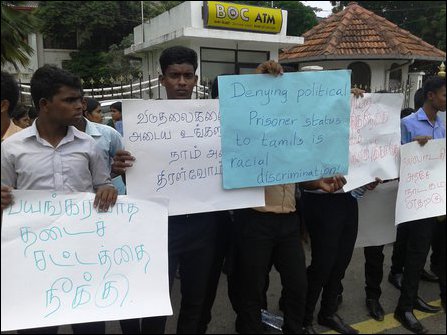
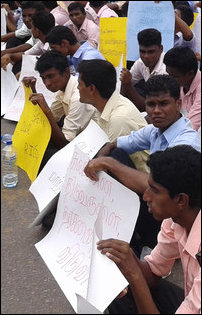
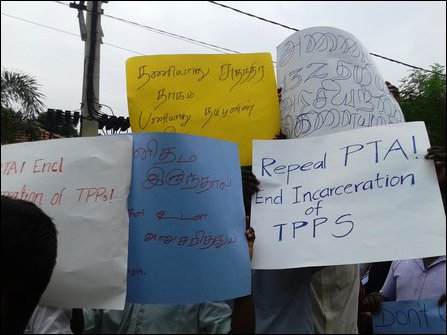
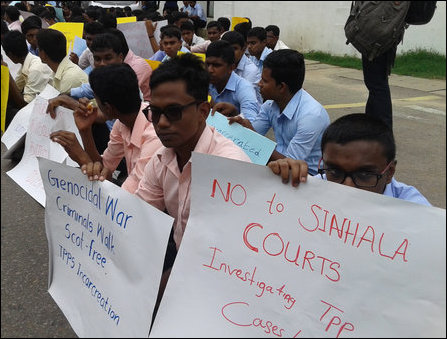
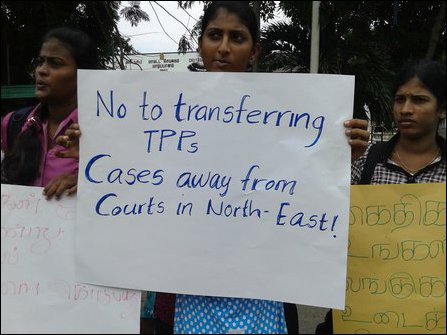
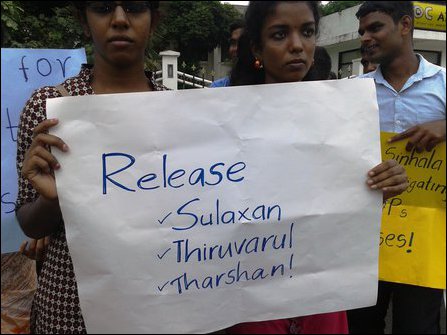
கருத்துகள் இல்லை:
கருத்துரையிடுக